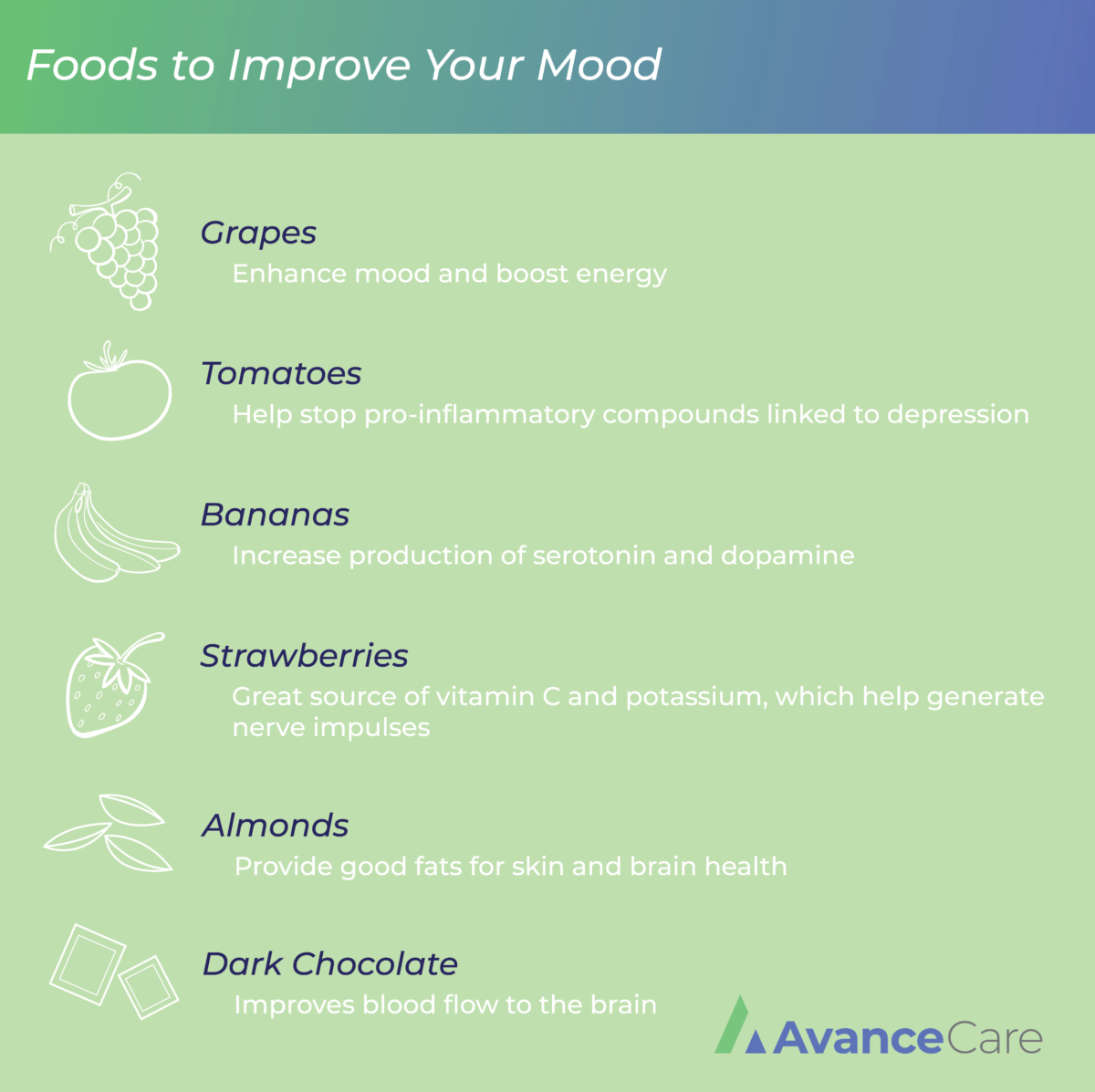Avance Care Behavioral Health blog posts are all about helping people understand the connections between mental health, nutrition, and physical health. All are equally important to your overall health and quality of life. It’s all in the research and is precisely why Avance Care is foundationally based on an integrated care model. This model has been proven to mitigate patients falling through healthcare gaps, provides continuity of care, keeps healthcare costs low, and decreases accessibility challenges while increasing convenience that may not otherwise be available.
Food = Fuel
Let’s first have a brief biology lesson. Did you know that according to the Harvard Medical Review, 95% of your serotonin is produced in your gastrointestinal tract? Serotonin is a neurotransmitter or hormone that regulates sleep and appetite, mediates mood, and inhibits pain. Scientists have now identified a direct connection between the millions of nerve cells or “neurons” in the gastrointestinal tract that directly connect to the brain. The evidence is so strong that a new field of medicine is growing in popularity: Nutrition Psychiatry and that connection is now referred to as the “Gut-Brain Axis.”
Taking this concept one step closer to you personally, did you ever secretly wonder why your Avance Care providers encourage you during every physical to increase both your intake of nutrient dense foods and your exercise? Is your provider hinting to you that you are overweight? Not necessarily! Research has now demonstrated that walking stimulates production of your “happy hormones” and so, that encouragement to take a walk may not only be all about your physical well-being. It can also be about your mental health as well.
Trust Your Gut
Your body speaks to you! If you take the time to listen, it will tell you exactly what it needs. Learning to be mindful and intentional around food and exercise is very important. It is an essential part of your self-care regimen and good self-care can serve as a preventive measure to all types of future challenges.
Eating is an entirely sensory experience. One in which drive-thrus and fast-food restaurants do not allow you to capitalize on. Food is all about the presentation, smell, feeling, texture, and taste. Being intentional and mindful when eating and savoring every sensation stimulated by your food is important to your overall health. Why? Because being present and focused on the meal in front of you not only allows you to fully enjoy and taste the food but, it allows you to remain connected with your body’s satiation cues. More simply stated, you are less likely to overeat!
Your food choices could also benefit from training your brain to be mindful around food. At Avance Care, we promote the “health-at-any-size” movement, body acceptance, and intuitive eating; Trust your gut! We do not buy into diet culture’s misinformation about food. Food has never done anything to anyone and as such, it cannot be “bad” nor “good.” Food is just food! Fuel for the body. There are nutrient dense foods and less nutrient dense foods, but all are just food.
Depriving yourself of culturally normative foods like ice cream, pizza, and birthday cake has been proven through research to be counterproductive and DOES. NOT. WORK. You may lose weight while on a restrictive diet but, once you return to culturally, normative eating, countless research experiments indicate that people eventually gain back the weight lost plus some. Over the course of the lifespan of a habitual dieter, that “plus some” extra weight gain continues to accumulate with each diet to generate an overall positive and significant weight gain. It is ludicrous to believe that an American human will never indulge again in their child’s birthday cake or ice cream, or pizza, or spaghetti. And, once someone feels deprived, the likelihood of binge eating increases as well.
Listen to Your Body
Instead, ask your body what it needs and, take the time to listen. Try using the “Foods to Improve Your Mood” list below to address mental health challenges that may facilitate emotional eating. Err on choosing nutrient dense alternatives to highly processed foods, not because you want to lose weight, but because you love yourself enough to take care of your body at whatever size and shape. You deserve to feel good. You deserve to be a priority in your life! If you wish for something salty/crunchy…try some baby carrots dipped in dressing or peanut butter, or some almonds. If you are craving something sweet perhaps an apple with peanut butter and/or honey will satisfy you. If you decide however, that you genuinely are craving chips or cookies, suspend judgment and mindfully eat what will satisfy your craving.
Tips
Here are some great strategies you may wish to try:
- If possible, purchase processed snack foods in single serving containers to prevent mindless snacking in front of the television. If you must purchase larger bags, only take a serving size to eat at a time. Force yourself to check in with your body periodically before reaching for another bite or an additional portion.
- An even better strategy is to not purchase snack food and force yourself to have to purposefully go to purchase it in the moment if you genuinely think that you want it to eat.
- Try to take a walk to spend the time checking in with your body. Is it bored? Sad? Anxious? One walk and the increased production of your “happy hormones” could be all your body wanted. Check Figure 1 for some great mood boosting foods to avoid emotional eating. Remember: food is fuel for the body; food is not a companion, an antidepressant, or a boredom buster.
- HYDRATE! Drinking water is important because most of your body is made of water. Water also takes up space in the tummy so it can also prevent the need for those quick drive-thru grabs before dinner.
- Expand your taste repertoire. This means ariety, variety, variety. In our family, when my children were young, once a week we had “tasting events”. I would shop in a culturally different grocery store and purchase fruits and veggies that I never saw before. My children and I would taste each new food and use descriptive words to express how it tasted to them. If we enjoyed the taste, we purchased more. If we did not, we did not purchase it again. Through our weekly tasting events, my children and I discovered a love for Asian pears, sushi, quinoa and countless vegetables not typically eaten in the American diet. As adults, my children now eat from all cultures and enjoy trying new foods as a lifelong adventure AND my 7 year old granddaughter’s top rated food of choice….”shooshi (Sushi).” “Gamma. Let’s get some shooshi.” Now who can resist a request like THAT?



